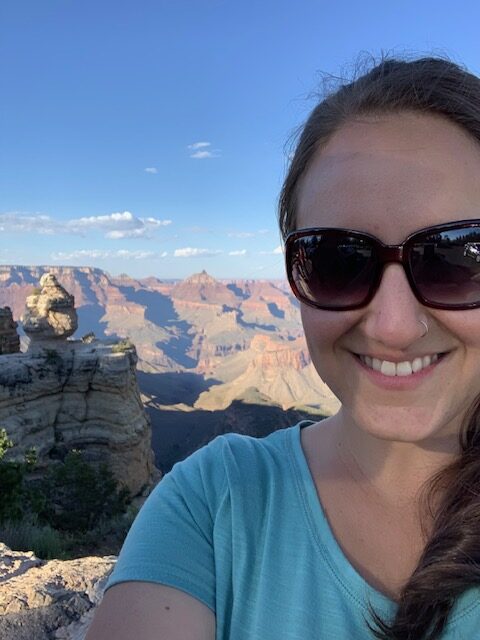Welcome to our final installment of Ask a Doula, in honor of World Doula Week. We chatted with Jessie Salvin from Cambridge’s Ahava Doula Services. A former preschool teacher, she recently relocated back to Massachusetts after launching her labor and postpartum doula business in Denver. Here’s her candid advice about birth in the time of COVID-19, and the power all women possess.
What drew you to this as a career? Why did you want to become a labor and postpartum doula?

I worked as a preschool teacher for about 10 years, and I worked with infants. I felt like there was a huge disconnect—the support from zero to three months was just so lacking. People would come into the preschool and need all this support and information, and it just felt like it wasn’t available. Early baby life is such a crucial time for parents to be supported, and for the baby to be supported and just nurtured throughout. I felt like that was what I wanted to do. And then a friend of mine was like, “Oh, that sounds like a postpartum doula!” I looked up what it was and thought, “That’s exactly the job I wanted, but I didn’t know what it was called!” I immediately signed up for training, quit my job as a preschool teacher and became a doula. I saw the need for support, and I fell in love with it. I’m really excited to be doing this work now, helping families build that early connection with their baby and be supportive.
Does Judaism inform your practice?
I feel like part of the Jewish tradition is that family connectedness. I’m not a very religious Jewish person, but I have gotten clients through the Jewish community, and it has been nice. I have worked with Orthodox families, and I’m able to really respect their kosher dishes and their kitchen, understand the language and really just support them from where they are coming from. I felt that to be a really powerful experience, because there aren’t a ton of Jewish doulas, especially in Denver.
Why hire a doula? What are the reasons that somebody might want to have that kind of support?
Related
My goal is to meet the client where they are and stay attuned with that client and support them through their birth journey. Then, I do end up working with families into that postpartum period. It’s about having someone there who’s 100% there for you and are making sure that you have what you need the whole time.
What are some common fears, misconceptions or hurdles that you’ve helped women through? What are some common things you’d like people to know going into the birth experience?
A lot of people are nervous about caesarean birth and medical interventions if they don’t want them. A lot of people who hire doulas are looking for the un-medicated birth, and I think that’s a misconception about doulas, because doulas can be hired for a planned caesarean birth. Every birth is a birth. I think that’s a big misconception. Doulas are not only for people who want an un-medicated vaginal birth, and not only for home births. We obviously support those things, but then home births can turn into an emergency caesarean, and we need to be able to stay with that client and attune with them and make sure they’re still supported.
Another thing that has been a really tough thing for doulas in this last year, obviously, is COVID. Since we’re not medical providers, we haven’t been seen as necessary, so a lot of doulas haven’t been allowed to go into hospitals since COVID started. It is opening up more and more. I’ve been allowed in a couple of places, but I’ve also done a lot of virtual births in the last year, which has definitely been a huge learning curve.
What happens in a virtual birth?
Comfort and relaxation techniques, and asking questions and making sure they’re staying informed and making sure they’re still having that positive birth experience with or without me there. I’ve done a lot of texting, and I’ve even sent videos of things where I’m like, “Oh, I didn’t talk about this with you, but maybe try this position.” It’s me sitting in my sweatpants on an iPad at a birth. It’s very strange.
What would you say to women who are pregnant during this strange time? Do you have any words of advice for people who might feel even more nervous than they would under average circumstances?
People are capable of doing incredibly hard things, and this is one of them. You have everything you need to be the best parent for your baby. Also, it’s OK to grieve the stuff that you expected for early pregnancy and early postpartum, such as sharing your baby with people. I’ve had families for whom I’ve been the only person the baby sees other than their parents, and it’s tough.
Many women have a birth plan and might get upset if they end up having a C-section or using medication. What would you say to that?
Every birth unfolds differently, and interventions are there for a reason. Prenatally, I do make a birth plan for vaginal birth, unmedicated, whatever they want, but then I also talk through [possibilities]. Sometimes a birth ends up needing a medical intervention, and we’re lucky to have science that can help babies get out safely, if that’s necessary. As a doula, I like going into the operating room with a client, making sure they’re never alone. Because a lot of times, the baby will be taken out through caesarean birth, and then the partner will stay with the baby, of course, if that’s what the birthing person wants, but then the birthing person is there alone with their body torn open. They’re alone, and their baby’s away from them for the first time in 10 months. And so I make sure that I’m with them, talking them through what’s going on and making sure they’re still really connected to that birth and to their baby. There’s a lot of unpacking after and processing.
Any final words of wisdom?
Trust your body, trust your baby and trust your intuition.





